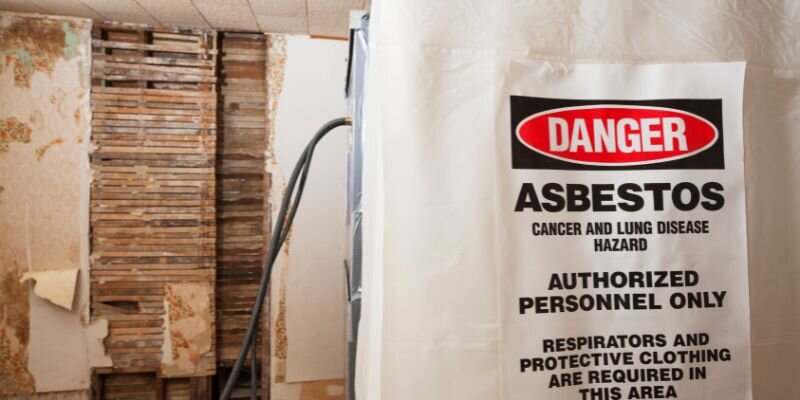
Selling a Texas house containing asbestos can seem challenging, especially if you’re concerned about the state’s disclosure requirements. Understanding your legal responsibilities and options is essential to protect yourself and attract informed buyers. This comprehensive guide will outline what Texas law says about selling homes with asbestos, outline key steps in the selling process, and provide practical tips for handling disclosures and remediation. Whether listing your property or negotiating a sale, this resource ensures you’re prepared to navigate the process confidently and transparently. If you’re ready to sell quickly but safely, learn how our process works to see how we handle homes that may need special attention, including those with asbestos.
Key Highlights
- Texas law requires full disclosure of asbestos presence by home sellers, with legal and financial risks for noncompliance.
- Asbestos is common in older Texas homes and is often found in insulation, flooring, and roofing materials.
- Professional asbestos abatement boosts home value, streamlines sales, and reduces buyer concerns and legal liabilities.
- Real estate agents must guide sellers through Texas asbestos regulations and ensure complete, transparent documentation.
- Effective marketing, transparent communication, and strategic pricing attract buyers even when a home contains asbestos.
Understanding Asbestos in Texas Homes

Many homeowners and sellers throughout Texas face critical questions about asbestos in their property, especially when it’s time to list a house. Recognizing the presence of asbestos and the most common types and materials found in a Texas home is essential for anyone involved in a real estate transaction. Whether you’re planning to sell your Texas home or simply want to understand the potential health and legal implications of asbestos, it’s essential to be well-informed. By familiarizing yourself with the key characteristics of asbestos found in your house, you’ll navigate negotiations, disclosure, and compliance requirements when selling a Texas house. For homeowners who prefer to avoid complex remediation or legal hurdles, cash home buyers in Texas can simplify the process by purchasing properties “as-is,” regardless of asbestos concerns.
Common Types of Asbestos Materials Found in a Texas Home
When dealing with real estate throughout Texas, one of the most crucial considerations for any homeowner or potential home seller is the range of asbestos materials that could be present within the property. Asbestos was historically prized for its heat resistance, durability, and insulating qualities, leading to its widespread use in various building materials across Texas homes, particularly in those constructed before the 1980s. Today, understanding which types of asbestos materials are commonly found in a Texas home is vital for anyone concerned with their property’s resale prospects. Texas homes’ most prevalent asbestos materials include insulation, floor tiles, ceiling tiles, textured paints, roofing shingles, and cement siding. These materials, once provided, offer cost-effective solutions for builders but can now present significant risks if damaged or disturbed during renovations or inspections. One critical area is attic and wall insulation. Homes in Texas built in the mid-20th century often feature loose-fill or batt insulation that may contain asbestos fibers, particularly vermiculite insulation, which was commonly sourced from mines contaminated with asbestos. Asbestos-containing insulation may also be found wrapping pipes, ducts, and boilers, all typical in older Texas homes and sometimes still present in houses changing hands today. The presence of such materials poses a risk mainly when they are disturbed, which is common during upgrades or even standard home inspections required before a sale. Flooring is another frequent source of asbestos in Texas houses. Nine-inch and even some twelve-inch vinyl tiles, and the adhesive mastic holding them, are notorious for containing high levels of asbestos. Homeowners and potential buyers in Texas should also watch for asbestos in linoleum and resilient sheet flooring, which appeared in many mid-century homes. Damaged flooring can easily release asbestos fibers into the environment, increasing exposure risk, an essential consideration for anyone planning renovations or updates before listing the property. Meanwhile, ceiling tiles, popcorn-textured ceilings, and certain types of drywall joint compounds used throughout Texas homes commonly contained asbestos well into the late 1970s. The popularity of these materials means they’re found in building inspections and real estate assessments. Similarly, exterior materials, such as roofing shingles, siding panels, and eaves, were manufactured with asbestos fibers to resist fire and weather. Many Texas homes still show these original features, especially in regions with high concentrations of historic properties. Beyond major building components, even smaller and more obscure items in Texas homes can hide asbestos. This scenario includes old furnace gaskets, window putties, and attic hatch covers. The sheer range and variety of asbestos-containing materials in a Texas property underscore why sellers and buyers must keep asbestos on their radar during real estate transactions. In summary, asbestos is more common than many Texas home sellers realize. Its use spanned nearly every aspect of residential construction, meaning homes, houses, and properties may harbor asbestos, regardless of style or size. Knowing which materials most likely contain asbestos helps Texas homeowners make informed decisions about disclosures, renovations, and sales strategies. Proactively investigating and identifying asbestos-containing materials can protect you legally and financially when selling a house in Texas, while demonstrating diligence to potential buyers. This awareness is the cornerstone of responsible homeownership and real estate practice in the Texas market today.
Health Risks and the Importance of Asbestos Awareness
Understanding the health risks of asbestos exposure is paramount for Texas homeowners and buyers looking to navigate the real estate market safely and responsibly. As homeowners become more aware of the dangers presented by asbestos in a house, they’re equipped to make informed decisions that protect not just their well-being but that of prospective buyers. Building on previous insights about identifying asbestos materials in Texas homes, this section explores why asbestos awareness is essential. It examines the impact of exposure on health and the decision-making process for both buyers and sellers. Emphasizing the risks and fostering greater asbestos awareness ultimately benefits everyone involved in a Texas property transaction. If you’re unsure whether investing in removal is worth the cost, consider alternatives like selling directly to we buy houses in Tyler companies, which specialize in purchasing homes that may need updates or asbestos handling.
How Asbestos Exposure Impacts Texas Homeowners and Buyers
For Texas homeowners, asbestos in the home is more than a simple property concern; it’s a serious health risk that can have lasting consequences for anyone living in or purchasing that house. Asbestos fibers are microscopic and easily released into the air when certain materials are damaged or disturbed during renovations, repairs, or routine home maintenance. Once inhaled, these fibers can embed themselves in the lungs and other organs, leading to severe health conditions. Diseases such as asbestosis, lung cancer, and mesothelioma are well-documented outcomes of asbestos exposure. Texas homeowners aware of these risks can take proactive steps to safeguard not just their health but also that of their families and visitors. This growing awareness in the Texas real estate community reinforces the importance of diligence before listing a house, especially when transparency can directly impact buyer negotiations. The impact of asbestos exposure is especially significant for buyers, many of whom may not realize the risks involved when purchasing an older Texas house. Buyers seeking their dream home or investing in Texas properties might unknowingly risk their health if asbestos materials are not disclosed or properly handled. Asbestos exposure isn’t immediate or apparent; symptoms of related health problems can take decades to develop, making early prevention through awareness crucial. Texas buyers who understand these risks are more likely to demand proper disclosure from sellers, commission asbestos inspections, and potentially factor remediation costs into their purchase decisions. For homeowners, responding thoughtfully to these buyer concerns can facilitate a smoother, more transparent sales process and foster trust, qualities essential in today’s housing market. Beyond the obvious health implications, asbestos exposure carries emotional and financial risks for homeowners and buyers in Texas. Living in a house with undisclosed or unmanaged asbestos may increase anxiety about long-term health effects, reduce property values, and even expose both parties to potential legal liabilities if proper asbestos awareness protocols are ignored. Texas homeowners who take asbestos risks seriously and act transparently protect themselves and signal a commitment to ethical standards that buyers appreciate. Buyers, in turn, may be more comfortable closing on a Texas house where the risks have been clearly identified, managed, or abated, making the property more attractive despite the history of asbestos. This dynamic is critical in shaping buyer demand and expectations across Texas.
Legal Aspects of Selling a Texas Home With Asbestos

Understanding the legal framework is crucial for any homeowner or seller planning the sale of a Texas house with known or suspected asbestos. The law in Texas sets strict requirements regarding property disclosure, encompassing the seller’s obligations and the necessary steps for compliance. A home’s status regarding asbestos will impact the property disclosure process and shape negotiations, risk management, and the overall sales process. Being fully informed about state and federal legal standards and the practicalities of disclosure helps you avoid legal pitfalls, build buyer trust, and put your sale on a solid legal footing.
Property Disclosure Obligations for Asbestos in a Texas Property
Navigating the property disclosure obligations when selling a house with asbestos in Texas is one of the most pivotal legal responsibilities for any home seller. The law mandates that sellers provide accurate, honest information about the presence of asbestos in the home. It’s a component in an attic, a significant element in wall insulation, or hidden in floor tiles. This legal requirement for disclosure means transparency is more than just best practice; it’s a forcible obligation under Texas real estate law, with substantial implications for buyers and sellers throughout the house sale process.
Texas property disclosure law explicitly requires disclosing all hazardous materials in a property, with asbestos topping the list due to its associated health risks and regulatory status. Whether you’re a single-family house, a residential home, or an investment property, Texas legislation is clear: failing to disclose asbestos has repercussions. Not only can a nondisclosure result in civil penalties and lawsuits, but it may also enable buyers to rescind a sale or sue for damages long after the home has changed hands. This creates a legal and financial risk for sellers not prioritizing full asbestos disclosure.
The Texas Seller’s Notice, which must be provided in virtually all residential real estate transactions, contains a direct question about the awareness of asbestos and other hazardous substances on the property. Home sellers are legally required to check the relevant boxes and explain the nature, location, and any remediation efforts regarding asbestos. Accurate property disclosure means you need to be thorough; simply saying “unknown” when you actually know may breach Texas law and open the door to future legal action. Even if you’re consulting an attorney to clarify your disclosure obligations, it is a wise step that aligns with good legal practice and industry best practices.
Buyers throughout Texas have become especially vigilant about asbestos thanks to public health awareness campaigns and increased scrutiny by real estate professionals. As noted previously, Texas buyers expect robust, honest disclosures about any potential risks tied to a home, ranging from lead paint and mold to asbestos. This expectation is not just industry-driven but rooted in legal rights under Texas law, empowering buyers to make fully informed choices about a house or home they may wish to purchase. Sellers who gamble by skirting these disclosure requirements violate the law, and their success is the satisfaction of their sales process.
Another legal consideration is that many Texas loans, insurance companies, and real estate contracts also hinge on full property disclosure. Failing to document asbestos presence can derail appraisals, insurance underwriting, or even mortgage approvals, setting the house sale back months or causing it to fall through entirely. Some real estate deals involve additional local ordinances or community requirements for asbestos disclosure above and beyond Texas law, making staying informed on state and municipal statutes essential. It’s wise for a seller to seek guidance from a qualified attorney familiar with Texas property law to review disclosures before listing a home.
Furthermore, ethical obligations imposed on real estate agents and brokers across Texas mirror the legal landscape. Licensed agents are required by law and industry codes to ensure their clients uphold disclosure requirements for asbestos. Any attempts to conceal or downplay asbestos presence could implicate sellers and their agents in legal trouble, leading to license penalties or litigation.
For many homeowners, learning about a legal requirement for asbestos disclosure may seem daunting, especially if they’re unfamiliar with the broader Texas law or suspect, but do not know for sure, that their house has asbestos. However, complying with property disclosure rules generally works in a seller’s favor, reducing liability, expediting the house sale, and building trust with buyers. Understanding the documents needed to sell a house in Texas also helps ensure that every legal detail—from asbestos disclosure to title verification—is handled properly. Updating buyers with comprehensive, accurate asbestos disclosures aligns with Texas law, demonstrates honesty, increases buyer confidence, and sets a transparent legal tone from the outset of negotiations. By prioritizing legal property disclosure, you protect yourself, your buyer, and the future of your Texas home sale.
Navigating Asbestos Laws and Real Estate Regulations

Navigating Texas asbestos laws and real estate regulations demands working knowledge of current state requirements. Sellers in the Lone Star State face unique legal and procedural challenges when asbestos is present in the home. Understanding the intersection of Texas law, property disclosure mandates, and best practices for handling asbestos can empower sellers to avoid legal pitfalls, foster buyer trust, and streamline the sales process. This part of your asbestos journey will clarify precisely what’s required, outline the most important guidelines, and explain how effective collaboration with real estate agents can help ensure compliance and a smooth transaction throughout Texas.Ultimately, navigating Texas asbestos regulations hinges on total transparency, strict adherence to established law, and seamless partnership between seller, agent, and licensed professionals. For sellers who want expert guidance throughout this process, the House Buying Heros team can help ensure compliance and streamline your home sale from start to finish.
Key Texas Guidelines for Home Sellers Handling Asbestos
Grappling with asbestos in a Texas real estate transaction means embracing some of the strictest guidelines imposed by state and federal law. Understanding these key Texas regulations is essential for home sellers and agents, not just for legal compliance but for a successful, low-risk sale. One of the primary concerns for Texas home sellers is disclosure. Texas real estate law requires sellers to disclose any known presence of asbestos in their home, no matter how minor or isolated it may be. The Texas Seller’s requirement explicitly asks about asbestos, holding sellers to a full, accurate honesty standard. Even if the home has asbestos in attic insulation or vinyl floor tiles, omitting or minimizing this fact is a breach of the law. It can lead to lawsuits or even the reversal of the sales contract. Beyond initial disclosure, home sellers must also be mindful of managing and handling asbestos while preparing the property for sale. Both Texas and federal guidelines tightly regulate the process, which comes from originating repair services. Under federal law, performing unlicensed asbestos removal is illegal; Texas mandates that only licensed professionals handle abatement, and in many cases, certified agents must conduct testing for asbestos. Any attempt by the home seller or contractor to handle asbestos can constitute a law violation, resulting in significant financial, health, and legal liabilities. One essential aspect that often gets overlooked is the role of real estate agents. Agents in Texas aren’t responsible for a sale; they’re their sellers who uphold all regulations and lawfully navigate the asbestos issue. Failing to disclose adequately or omit asbestos information properly puts not only the seller and agent at risk under Texas law. Texas agents must guide sellers through the process, recommending certified inspectors, ensuring the disclosure paperwork is comprehensive, and keeping a line of communication open between buyer, seller, and regulatory agencies. The Texas Department of State Health Services (DSHS) establishes detailed guidelines for how asbestos-containing materials must be managed in residential settings, including requirements for written notification before any demolition or significant renovation. Moreover, real estate transactions involving older homes often trigger additional federal regulations, such as those set by the EPA’s National Emission Standards for Hazardous Air Pollutants (NESHAP).
Homeowners and important agents must know that following these laws and rules is essential to avoid delays, canceled agreements, fines, or legal trouble. Texas guidelines also encourage proactive documentation. Sellers who hire asbestos professionals to inspect, monitor, or abate asbestos should maintain thorough records. Providing this documentation to the buyer helps demonstrate compliance with state law, makes the buyer feel more informed and protected, and can even reduce the likelihood of future disputes over who’s responsible for asbestos-related issues or mishandled asbestos. In this respect, agents play a pivotal role in helping sellers assemble and deliver the necessary documentation, advocating for their clients while shielding themselves from liability. Throughout the sales process, communication is paramount. Home sellers in Texas should work closely with their real estate agents to review all disclosure forms, double-check asbestos documentation, and stay updated on local ordinances that might impose stricter requirements than the statewide guidelines. This attention to detail, rooted in Texas law and real estate best practices, reassures buyers that all asbestos risks are adequately managed, boosting home confidence. Ultimately, navigating Texas asbestos regulations hinges on total transparency, strict adherence to established law, and seamless partnership between seller, agent, and licensed professionals, delivering a safer, more reliable process for everyone who sets foot in or on the estate.
Asbestos Abatement Options and Real Benefits for Sellers
For Texas home sellers, assessing asbestos abatement options isn’t about directly complicating things, selling, buying, or managing your home. While Home’s content covered the importance of asbestos disclosure, legal obligations, and risk management, this part dives into what abatement really means for sellers. By weighing different approaches to asbestos abatement and understanding their advantages, Texas homeowners can enhance buyer confidence, streamline the real estate process, and unlock potential price improvements. Evaluating abatement solutions and their real benefits helps sellers present their property as a safer, more market-ready investment, ultimately influencing both the sales timeline and final transaction outcome.
Helpful Texas Blog Articles
- How Long a Seller Can Stay After Closing in Texas
- Texas Inherited Property With Your Sibling
- Easiest Way to Move Houses in Texas
- Selling Shares of Your Home in Texas
- Can You Sell a House With Asbestos in Texas
- Documents Needed to Sell a House in Texas
- Understanding Divorce Home Appraisal in Texas
- How to Sell a Condemned House in Texas
- Does a Seller Pay Closing Costs in Texas?
- Selling Shares of Your Home in Texas

